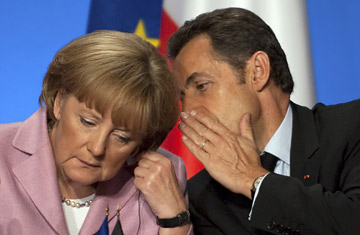
French President Nicolas Sarkozy speaks with German Chancellor Angela Merkel
So much for European unity. Less than 24 hours after leaders of the European Union's four largest countries gathered in Paris Saturday to pledge a collective defense in the global financial crisis, the strategy crumbled in the face of a still worsening credit crisis in Europe's banks. German Chancellor Angela Merkel, faced with the breakdown of a government-brokered deal with German banks to save one of Germany's biggest mortgage lenders, announced that all German bank deposits would be guaranteed by the government, causing consternation and anger among her European neighbors, many of whom felt compelled to follow suit.
Europe's inability to rise above its "each nation for itself" mode bodes ill for the prospect of broader international coordination to shore up credit markets in the face of a global crisis of financial confidence. If countries that have long vaunted their joint destinies can't work together, it seems all the more difficult to envisage a global response of governments and regulators toward a financial sector that itself cares little for national borders. Certainly Germany's unilateral action didn't help European markets resist a strong downward trend from Asia, and indexes plunged on Monday, with the FTSE 100 in London, the CAC 40 in Paris and the DAX in Frankfurt each falling around 6% as morning trading opened. By midmorning, Iceland had suspended trading altogether in financial shares.
The gap between Saturday's rhetoric and Monday's reckoning was amply visible in advance. For all the brave-sounding statements about a common response at French President Nicolas Sarkozy's conclave on Saturday, he and Merkel, along with Prime Ministers Gordon Brown of Britain and Silvio Berlusconi of Italy, couldn't agree on substantial international measures to shore up Europe's beleaguered financial markets; they in fact had little standing to do so. By Sunday, the national governments in the 27-member E.U., including the 15 that use the euro currency, all seemed concerned first and foremost with the conditions of their own imperiled banks. Nowhere more than in Germany, where the Finance Ministry enjoined German banks to double their commitments to bail out troubled mortgage giant Hypo Real Estate AG. A rescue deal that was hailed last week at a total cost of $48 billion had crumbled; now it is pegged at a minimum $69 billion, $21 billion of that from state coffers. Some analysts voiced concerns that even that might not be enough.
(For photos of the financial crisis, click here.)